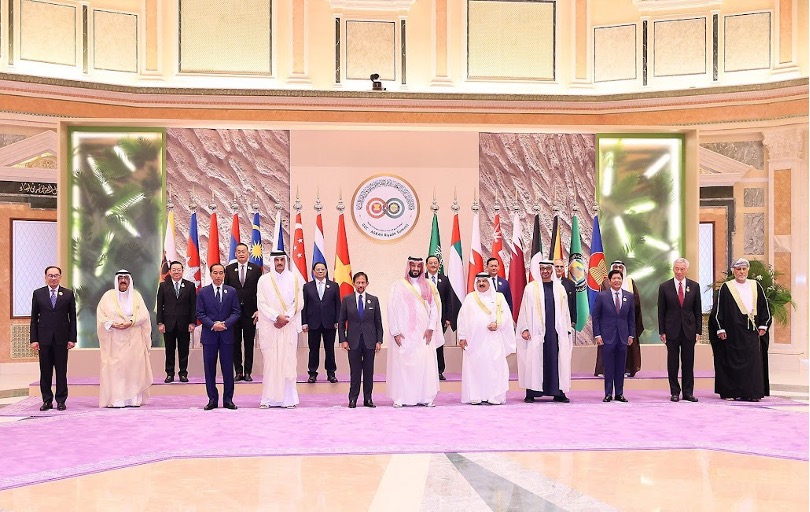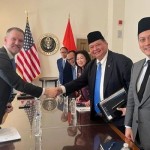Total number of posts 463.
Considered to be two regions that will witness strong growth this decade, cooperation between ASEAN and the Gulf countries promises to be a promising economic bridge in the future, and a strong link in the global supply chain.

The Gulf Cooperation Council (GCC) is a regional intergovernmental political and economic union comprising most of the Arab states of the Persian Gulf, namely Bahrain, Kuwait, Oman, Qatar, Saudi Arabia and the United Arab Emirates (UAE). It is a region that includes many of the world's fastest-growing economies, notably the UAE with an expected economic growth rate of 5.5% by 2025 and Saudi Arabia with a growth rate of 4.8% by 2025. ASEAN-GCC relations began in 1990, when the Foreign Minister of Oman, in his capacity as Chairman of the GCC Council of Ministers, expressed his desire to establish formal relations with ASEAN. Since then, with total trade reaching $130.7 billion by 2023, the GCC is ASEAN's sixth largest trading partner by 2023. Among the GCC economies, the UAE is the largest contributor, accounting for 44.9% of the GCC's total trade with ASEAN, followed by Saudi Arabia at 30.2%, Qatar at 10.9%, Kuwait at 8.3%, Oman at 4.7% and Bahrain at 1% (Oil and gas contribute a large part to the total ASEAN-GCC trade relationship at over 63.1%). In addition, the GCC is the 16th largest source of foreign direct investment (FDI) in ASEAN by 2023. In terms of tourism, the number of tourists coming from the GCC will reach 378,261 in 2022 (accounting for 0.9% of total tourists to ASEAN), making the GCC the 16th largest contributor to the number of tourists to ASEAN.
In terms of economic dialogue, the strengthening of regional cooperation with the region has been implemented early by both sides when in 2010, ASEAN and the GCC conducted a feasibility study on the ASEAN-GCC FTA. Although the negotiation process of this agreement has progressed slowly, both sides continue to implement activities to enhance cooperation. In October 2023, the first ASEAN-GCC summit held in Riyadh marked a milestone by adopting the ASEAN-GCC Cooperation Framework (2024-2028) which outlines cooperation measures and activities in political and security dialogue, trade and investment, as well as people-to-people exchanges, among others. The parties agreed to enhance trade and investment flows, with a special focus on sustainable infrastructure, renewable energy, petrochemicals, agriculture, manufacturing, healthcare, tourism, logistics, smart cities, connectivity and digitalization, while enhancing public-private partnerships and enhancing business cooperation across the regions. In addition, the Gulf countries have also shown considerable interest in reviving discussions on a potential FTA with ASEAN and in response to this positive signal, the 2nd ASEAN-GCC Summit is scheduled to be held following the 46th ASEAN Summit in May 2025. Speaking to the press on July 19, 2024, ASEAN Secretary-General Kao Kim Hourn expressed optimism that ASEAN and the GCC could reach a free trade agreement (FTA) as the GCC expressed “confidence in its desire to cooperate with ASEAN”.
For Viet Nam in particular, the relationship between Viet Nam and the Gulf countries has been promoted in many areas in recent times, from politics - diplomacy to investment, trade, tourism, etc. In 2023, the Ministry of Foreign Affairs of Viet Nam and the Gulf Cooperation Council (GCC) Secretariat signed a cooperation MOU, creating a basis for further strengthening relations between the two sides in the future. Notably, recently, Prime Minister Pham Minh Chinh paid an official visit to three Gulf countries including Saudi Arabia, the United Arab Emirates (UAE) and Qatar. The visit especially emphasized exchanges to promote economic, trade and investment cooperation with all three countries in particular and the Gulf region and the Middle East in general. The Prime Minister delivered speeches and conveyed many important messages at talks, meetings with leaders, conferences, events and had a series of meetings with Ministers, Secretaries of State of ministries in charge of economy, investment, industry, energy, foreign trade... of the UAE, Saudi Arabia and Qatar. In addition, the visit also achieved many goals when the Comprehensive Economic Partnership Agreement (CEPA) with the UAE is the 17th free trade agreement that Vietnam has participated in and was signed, setting a target of two-way trade turnover of 20 billion USD in the coming time.
It can be seen that strengthening cooperation with the Gulf countries is a promising direction for ASEAN countries in general and Viet Nam in particular when all parties show certain confidence in soon achieving the set goals and agreements. Although there will be many challenges, this cooperation opens up an opportunity to explore the inter-regional economic space and bring unprecedented opportunities for economic development of all parties.














